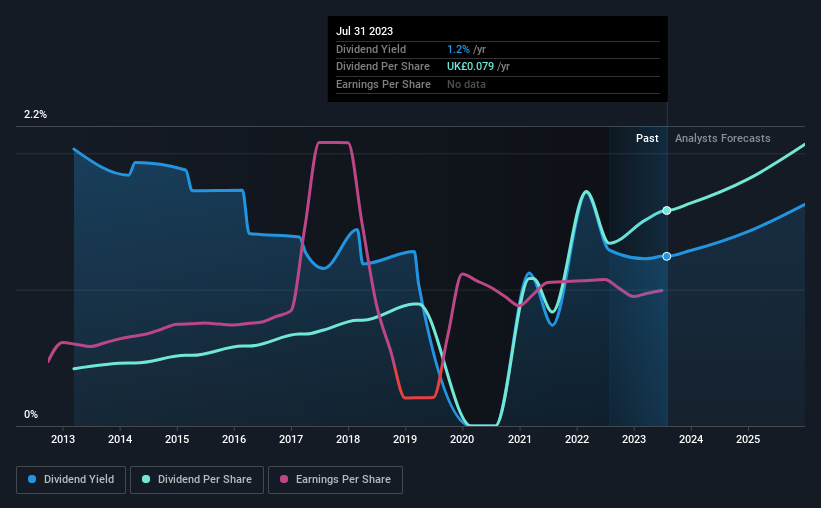Just One Day Till Rentokil Initial plc (LON:RTO) Will Be Trading Ex-Dividend
Regular readers will know that we love our dividends at Simply Wall St, which is why it's exciting to see Rentokil Initial plc (LON:RTO) is about to trade ex-dividend in the next day or two. The ex-dividend date is usually set to be one business day before the record date which is the cut-off date on which you must be present on the company's books as a shareholder in order to receive the dividend. The ex-dividend date is important as the process of settlement involves two full business days. So if you miss that date, you would not show up on the company's books on the record date. This means that investors who purchase Rentokil Initial's shares on or after the 3rd of August will not receive the dividend, which will be paid on the 11th of September.
The company's next dividend payment will be UK£0.028 per share, and in the last 12 months, the company paid a total of UK£0.079 per share. Based on the last year's worth of payments, Rentokil Initial stock has a trailing yield of around 1.2% on the current share price of £6.35. If you buy this business for its dividend, you should have an idea of whether Rentokil Initial's dividend is reliable and sustainable. We need to see whether the dividend is covered by earnings and if it's growing.
View our latest analysis for Rentokil Initial
If a company pays out more in dividends than it earned, then the dividend might become unsustainable - hardly an ideal situation. Rentokil Initial paid out 63% of its earnings to investors last year, a normal payout level for most businesses. Yet cash flows are even more important than profits for assessing a dividend, so we need to see if the company generated enough cash to pay its distribution. Fortunately, it paid out only 37% of its free cash flow in the past year.
It's positive to see that Rentokil Initial's dividend is covered by both profits and cash flow, since this is generally a sign that the dividend is sustainable, and a lower payout ratio usually suggests a greater margin of safety before the dividend gets cut.
Click here to see the company's payout ratio, plus analyst estimates of its future dividends.
Have Earnings And Dividends Been Growing?
Businesses with shrinking earnings are tricky from a dividend perspective. If earnings fall far enough, the company could be forced to cut its dividend. Rentokil Initial's earnings per share have fallen at approximately 21% a year over the previous five years. When earnings per share fall, the maximum amount of dividends that can be paid also falls.
Another key way to measure a company's dividend prospects is by measuring its historical rate of dividend growth. Rentokil Initial has delivered 14% dividend growth per year on average over the past 10 years. That's interesting, but the combination of a growing dividend despite declining earnings can typically only be achieved by paying out more of the company's profits. This can be valuable for shareholders, but it can't go on forever.
To Sum It Up
From a dividend perspective, should investors buy or avoid Rentokil Initial? We're not enthused by the declining earnings per share, although at least the company's payout ratio is within a reasonable range, meaning it may not be at imminent risk of a dividend cut. To summarise, Rentokil Initial looks okay on this analysis, although it doesn't appear a stand-out opportunity.
If you're not too concerned about Rentokil Initial's ability to pay dividends, you should still be mindful of some of the other risks that this business faces. We've identified 4 warning signs with Rentokil Initial (at least 1 which makes us a bit uncomfortable), and understanding them should be part of your investment process.
A common investing mistake is buying the first interesting stock you see. Here you can find a full list of high-yield dividend stocks.
Have feedback on this article? Concerned about the content? Get in touch with us directly. Alternatively, email editorial-team (at) simplywallst.com.
This article by Simply Wall St is general in nature. We provide commentary based on historical data and analyst forecasts only using an unbiased methodology and our articles are not intended to be financial advice. It does not constitute a recommendation to buy or sell any stock, and does not take account of your objectives, or your financial situation. We aim to bring you long-term focused analysis driven by fundamental data. Note that our analysis may not factor in the latest price-sensitive company announcements or qualitative material. Simply Wall St has no position in any stocks mentioned.
Join A Paid User Research Session
You’ll receive a US$30 Amazon Gift card for 1 hour of your time while helping us build better investing tools for the individual investors like yourself. Sign up here

